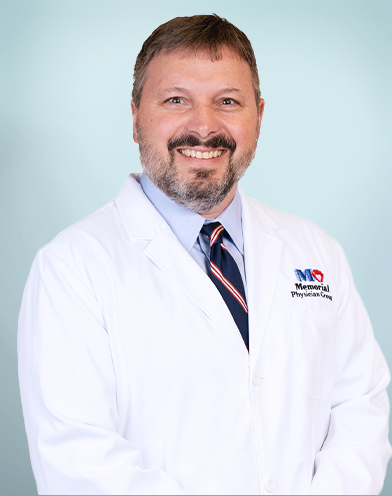Thyroid Cancer
Our team includes an endocrinologist, surgeon and ultrasound tech who specialize in thyroid cancer.
Thyroid cancer is often a silent disease, or symptoms can be a daily challenge, from pain to breathing problems to trouble swallowing. Prompt diagnosis is essential. Some types are slow-growing, but others are aggressive and need immediate attention.
Memorial Cancer Institute has a team dedicated to thyroid cancer. We offer expert diagnosis, medical and surgical treatments, follow-up screening and therapy to help you recover. Early and effective treatment can make a significant difference, potentially leading to a cure and better quality of life.
Diagnosing Thyroid Cancer
Thyroid cancer is a disease in your thyroid gland, a part of your endocrine system. The gland is in the front of your neck. It produces hormones that regulate metabolism, body temperature and heart rate.
Misdiagnosis and inadequate imaging are common in thyroid cancer care. But early, accurate diagnosis is an important step toward successful treatment. To diagnose thyroid cancer, we may recommend the following tests:
- Blood tests to measure hormone levels
- Biopsy to look for abnormal cells
- Ultrasound to get pictures of your thyroid and surrounding structures
Thyroid Ultrasound
Ultrasound is an essential tool in diagnosing thyroid cancer. Our imaging endocrinologists are specially trained to perform the test.Your endocrinologist and surgeon join you and your family in the room for the test. The results are displayed on monitors on the ceiling and walls so we can show you and explain what we see. You get your results immediately because the entire team is there.
Types of Thyroid Cancer
Your diagnosis includes an explanation of the type of thyroid cancer you have. There are four main kinds, depending on the type of cell where cancer started:
- Papillary: This is the most common type of thyroid cancer. It grows slowly and often can be cured.
- Follicular: This type is more likely to spread to other parts of your body and can be more challenging to treat.
- Medullary: About four percent of thyroid cancers are medullary. There are two types: sporadic (not inherited) and familial (inherited).
- Anaplastic: This is the least common type of thyroid cancer. It’s aggressive, often spreads and can be difficult to treat.
Memorial also has experts who diagnose and treat other endocrine conditions, including adrenal tumors. Our surgeons perform spleen and adrenal gland surgery, such as splenectomy and adrenalectomy, using the latest minimally invasive techniques.
Thyroid Cancer Treatment
Most thyroid cancers are highly curable. We recommend a plan that will be most effective and minimize the impact on nearby structures and their function. We are careful to preserve and protect as much of your thyroid as possible, as well as your voice, ability to swallow and nearby nerves.
Your treatment plan may include:
- Surgery: Surgery is often the most effective approach. We may recommend removing part of your thyroid (lobectomy) or the entire gland (thyroidectomy). The operation also can remove nearby lymph nodes if cancer has spread there.
- Radioiodine therapy: You swallow a small amount of radioactive iodine. The substance shrinks your thyroid gland and associated cancer cells.
- Hormone therapy: Certain medications can prevent cancer growth.
- Radiation: Radiation therapy delivers high-energy X-rays to a tumor to destroy cancer cells.
- Chemotherapy: These drugs are used in rare cases of advanced thyroid cancer to destroy cancer cells.
After treatment, we design a long-term care plan. This often includes medications to replace essential thyroid hormones. We may offer speech-swallow therapy to help you regain any lost function. We also design a plan for follow-up tests so that if cancer comes back, we catch it as early as possible.
Thyroid Cancer Care: Why Choose Memorial Cancer Institute?
When you come to Memorial for thyroid cancer diagnosis and treatment, you’ll find:
- Expert care: Our endocrinologists and surgeons are board-certified and fellowship-trained. They focus exclusively on the thyroid, not general endocrinology or head and neck cancer. Specializing in thyroid disease means they have extensive knowledge of thyroid cancer. Meet our team.
- Integrated team: We have a truly integrated program in which endocrinologists and endocrine surgeons work together. They meet with you at the same time and make treatment recommendations as a team. This type of close collaboration is rare in thyroid cancer care, but it helps ensure the best long-term outcomes. It is also more convenient because you don’t need separate appointments or get conflicting recommendations.
- High-volume center: Memorial performs many thyroid cancer surgeries every year. If you need surgery, you want to be treated at a center with extensive experience. Research shows that high-volume centers achieve the best outcomes with the lowest risk of complications.
- Center of Excellence: Memorial is one of only a few institutions designated as a Florida Cancer Center of Excellence by the Department of Health.
Advanced diagnostic technology: We have access to the latest technology. We also have a dedicated expert in endocrine imaging. They have special certification in head and neck ultrasound, so they understand what to look for during diagnosis. - Care for the whole person: The cancer journey can be overwhelming, affecting your overall health and mental health. Your team includes support staff who can help you function and live well. At Memorial, you have access to integrative medicine specialists, psychologists, social workers, nutritionists and speech/swallow therapists.









